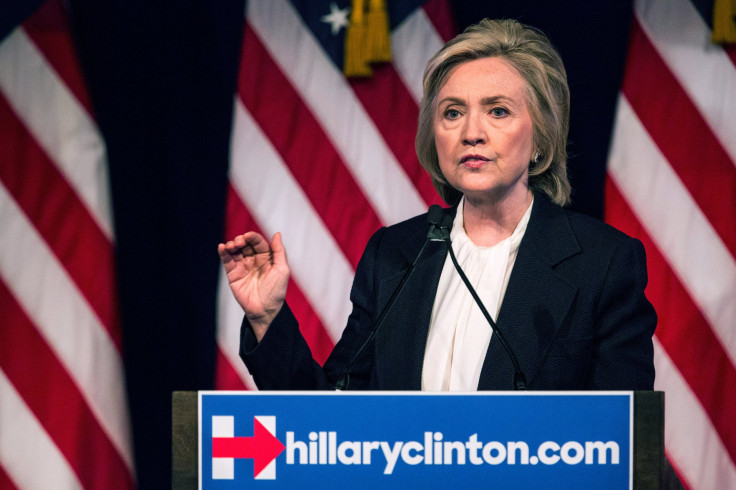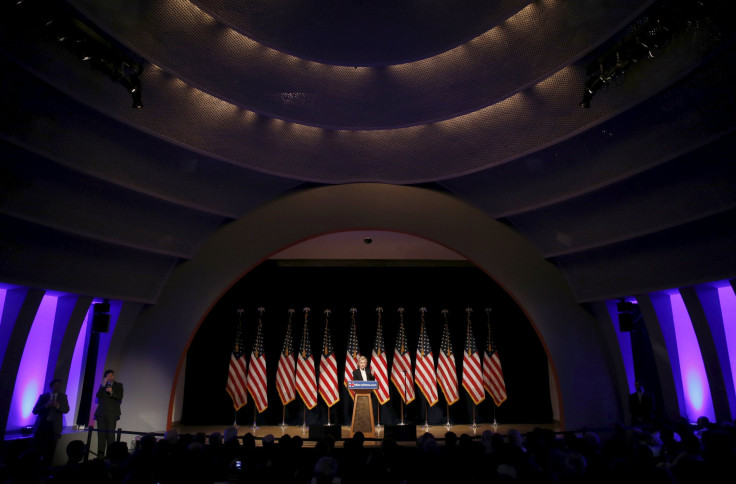Hillary Clinton 2016: Speech On The Economy Details Presidential Candidate's Vision

WASHINGTON -- Hillary Clinton delivered her most sweeping policy address thus far in the 2016 presidential campaign -- outlining a multitude of proposals that she says will help the middle class and bolster paychecks for Americans. Jobs and the economy have for decades been voters' top issues, making Clinton's first policy speech of the 2016 cycle crucial to her campaign.
“I confess maybe it’s the grandmother in me, but I believe that part of public service is planting trees under whose shade you’ll never sit,” Clinton said. “And the vision I’ve laid out here today -- for strong growth, fair growth, and long-term growth, all working together -- will get incomes rising again, will help working families get ahead and stay ahead. That is the test of our time.”
The speech -- delivered Monday at the New School, a university in New York City -- attempts to address persistent criticism that Clinton lacks a vision or detailed plan for the future. She tackled ideological positions while offering specific policy proposals that she intends to make central to her campaign. She also rolled out new proposals for reforming the capital gains tax and creating incentives for corporations that offer profit-sharing programs for employees.
Clinton has been striking a delicate balance when talking about policy, especially regarding the economy. It's a challenge all Democratic presidential candidates face heading into 2016: Is it possible for Clinton to praise the economic growth under Presidents Barack Obama and Bill Clinton and, at the same time, make the case to voters that she is different? It’s more complicated for Hillary Clinton, who is married to one of the former presidents and served in the administration of the other.
“Under President Clinton -- I like the sound of that -- America saw the largest peacetime expansion in our history -- nearly 23 million jobs, a balanced budget and surplus for the future,” Clinton said, referring to her husband. She made the case that there are still problems despite a Democrat holding office. “We’re not going to find all the answers we need today in the playbooks of the past,” Clinton said. “Nor can we just replay the successes. Today is not 1993. It’s not 2009. So we need solutions for the big challenges we face now.”
Clinton also used the speech as an opportunity to take on the current field of opponents. She named Jeb Bush, Scott Walker and Marco Rubio specifically in her speech and referred to the entire GOP field on several occasions. Her biggest jab was directed at Bush, who in a speech last week highlighted the lack of full-time jobs and said Americans needed to work longer hours. “You may have heard Gov. Bush say last week that Americans just need to work longer hours. Well, he must not have met many American workers,” Clinton said. “Let him tell that to the fast food workers marching in the streets for better pay. They don’t need a lecture. They need a raise.”
It was a primary campaign speech only in a few small ways, including a handful of jabs at Wall Street that appear to be an effort to make good with the left wing of her party, which has been wary of her willingness to go after financial companies.
The biggest break in her remarks with the current White House was a promise to prosecute banks and individuals in the finance industry who commit crimes -- a response to ongoing criticism from the left of the Obama administration's failure to do so in the aftermath of the most recent financial crisis. “We’ll ensure that no firm is too complex to manage or oversee,” Clinton said, referring to the “too big to fail” defense of large banks. “And we will prosecute individuals as well as firms when they commit fraud or other criminal wrongdoing.”

Clinton -- in a speech that lasted almost an hour -- plowed through several policy positions she would pursue as president. She divided her speech into three sections that outline how she sees economic improvement: strong growth, fair growth and long-term growth. She outlined several existing policies that she would continue. Clinton said she would defend the Wall Street financial reform legislation known as Dodd-Frank, which has become the target of many Republicans, including all who are running for president.
“I’ll protect the Affordable Care Act and build on it to lower out-of-pocket costs and to make prescription drugs more affordable,” Clinton said. “We’ll help families look forward to retirement by defending and enhancing Social Security and making it easier to save for the future.”
She also embraced policies that have been pushed by Democrats for years, such as working to make wages equal for women and providing affordable childcare. “It’s time to recognize that quality, affordable childcare is not a luxury, it’s a growth strategy,” she said.
But Clinton pledged to do more than simply continue the policies of previous Democratic presidents. “Many of these ideas are time-tested and more than a little battle-scarred,” Clinton said. “We need new ideas as well.”
One of her biggest new ideas is an incentive for companies that create profit-sharing programs for their employees. Currently, many corporations offer such programs, but Clinton argued that if they can be expanded, they would benefit both companies and employees. “Hard-working Americans deserve to benefit from the record corporate earnings they help produce. So I will propose ways to encourage companies to share profits with their employees,” Clinton said. “Studies show profit-sharing that gives everyone a stake in a company’s success can boost productivity and put money directly into employees’ pockets. It’s a win-win.”
Clinton said she plans to unveil more details about the profit-sharing proposal later this week in New Hampshire.
Clinton also took a swipe at the growth of the "contractor" economy, pointing to the increase in the number of people generating income from selling goods from their homes or driving cars for ride-sharing services.
"Meanwhile, many Americans are making extra money renting out a spare room, designing websites, selling products they design themselves at home, or even driving their own car," Clinton said. "This 'on-demand' or so-called 'gig economy' is creating exciting opportunities and unleashing innovation, but it’s also raising hard questions about workplace protections and what a good job will look like in the future."
Clinton also delved into the thorny issue of reforming the tax code -- a proposed rewrite that has been the center of much talk but little real action in Washington. Republicans want to revise the code to allow for rate cuts. Democrats want to rewrite it to eliminate loopholes and tax credits.
“Let’s agree that hugely successful companies that benefit from everything America has to offer should not be able to game the system and avoid paying their fair share, especially while companies who can’t afford high-price lawyers and lobbyists end up paying more,” she said.
Clinton knows that for all the policies she rolls out in a campaign, Congress can be the largest stumbling block. Obama and Bill Clinton both faced opposition from Republican-controlled chambers of Congress to fully execute their agendas. And the current state of Congress is one that would make it virtually impossible for a Democratic president to get anything passed.
"You know passing legislation is not the only way to drive progress. As president, I’ll use the power to convene, connect, and collaborate to build partnerships that actually get things done," Clinton said. “Because above all, we have to break out of the poisonous partisan gridlock and focus on the long-term needs of our country.
© Copyright IBTimes 2025. All rights reserved.






















